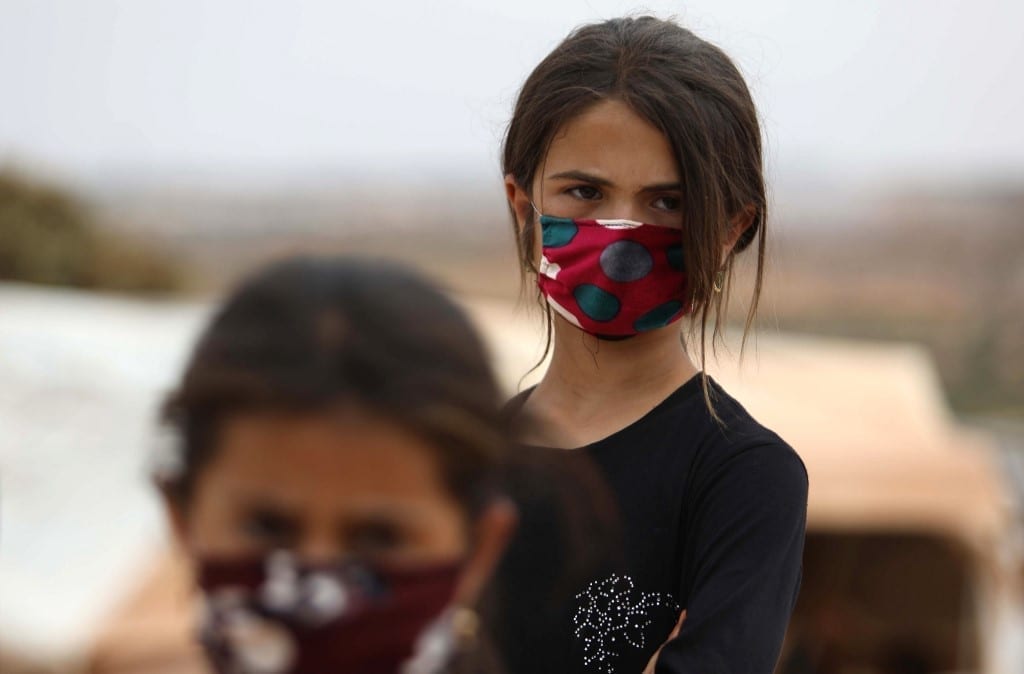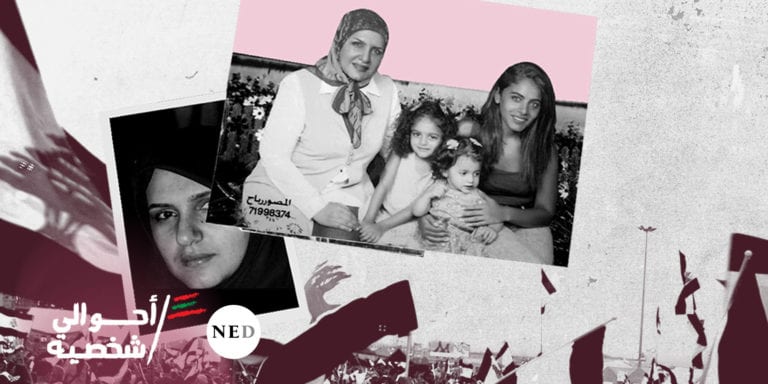In 2003, when Salwa was 17 years old, a financially well-off pharmacist wanted to marry her. He was 45. Her family thought it a once in a life time opportunity and convince the young girl to marry him.
“What an opportunity,” said Salwa (a pseudonym). “Back then, those words were enough to get engaged to someone over twenty years older than me. He’s a pharmacist, they told me. His financial and social status are good, which makes it hard for a girl to get him. Only the lucky ones can.”
However, her life did not at all turn out the way she had dreamt it to be. She was underage and she married someone much older, which is still a quite widespread phenomenon in Syria. However, her life did not at all turn out the way she had dreamt it to be. She was underage and she married someone much older, which is still a quite widespread phenomenon in Syria.
The marriage made her life go according to her husband’s plans under the pretext that she was young and he more experienced in life. This soon created problems within the couple.
They argued and fought, but Salwa was reluctant to separate. Her family pressured her not to. However, in 2017 she could not take it anymore and filed for separation from her husband with the help of an uncle who supported her. Salwa and her husband had three children during 18 years of marriage.
Syrian law places the decision to divorce in the hands of the husband. If the wife wants a divorce, she should file for ‘mukhala’ah’ (a consensual divorce in return for a compensation paid by the wife).
When I first met her, Salwa was in her worst psychological state. She had lost all hope her case would have a happy ending. In May 2017, she had filed for divorce at the Women’s House (Mala Jinê in Kurdish), an institution established by the Autonomous Administration of North and East Syria to supervise the application of the Women’s Law and submit cases to court.
The Syrian law places the decision of divorce in the hands of the husband. If the wife wants a divorce, she should file for ‘mukhala’ah’ (a consensual divorce in return for a compensation for the husband paid by the wife).
Salwa’s husband did not acknowledge the Women’s House. The lawsuit was put on hold for two months, before being brought before an Autonomous Administration court.
Her husband refused to attend and appointed a lawyer to attend instead of him. Due to his failure to respond, the court on February 1, 2018, gave Salwa her divorce
However, when Salwa a few months later tried to obtain some papers from the personal status department, she was surprised to learn she was still considered “married” by the Syrian government’s civil courts.

It meant she had to start the whole divorce procedure all over again, this time in a religious Sharia court.
Salwa’s story is one of many. It is a direct result of the Syrian war. Women are especially overburdened in the northeast of Syria, which roughly represents a quarter of the country’s total territory. Women in the northeast are compelled to deal with two civil status laws endorsed by the Syrian Regime on the one hand and the Autonomous Administration on the other.
The problem is that they do not acknowledge each other, nor do they acknowledge each other’s documents. The decade-long war and the many international and regional interventions in the conflict have put them on opposite sides. As a result, the women of the region have had to bear the greater part of the suffering in court halls, courthouses and judiciary chambers … on both sides.
This new reality has created a legal chaos in a region with traditionally a clan-based culture, and destabilized many people’s trust in the rule of law. People have dropped lawsuits to facilitate their personal matters, because of the high costs. Meanwhile, no efforts are being made to find a solution to ease the suffering.
“We have our laws and they have theirs,” said Bahia Murad, head of the Women’s House’ Reconciliation Committee in Qamishli. “We have nothing to do with them.”
In November 2013, the Autonomous Administration or what is known as Rojava was established in northeastern Syria. It is composed of vast territories, including the provinces of Al-Hasakah, Al- Raqqa, Deir El-Zor and part of the Aleppo countryside.
We have our law and they have theirs. We have nothing to do with them.
The Autonomous Administration established its own institutions, enacted its own laws, among which the Women’s Law, and established entities and courts to enforce it.
The Women’s Law, however, is completely different from the Syrian Personal Status Law and several other Syrian laws that are based on Islam as the main guiding principle.
Formal institutions and courts kept working in regions under control of the Autonomous Administration in parallel with the institutions of the latter. However, because of the radical difference in laws regarding women, the latter became victims of legal duplicity and chaos, in addition to the societal injustice and inequality from which many already suffer.
The Syrian Regime and Autonomous Administration do not acknowledge each other, nor each other’s documents, and this complicates life even more in terms of obtaining official paperwork regarding such things as marriage, divorce, inheritance and birth registration.
Until today, women have to go through the same procedure in two different courts to guarantee their rights. The first court belongs to the regime due to procedures and documents related to the period before 2013 when the Autonomous Administration was established. On the other hand, women will have to obtain documents from institutions under the Autonomous Administration, as that is currently in charge of the region.
Divorcing Twice
Salwa started her second divorce procedure in Syrian courts, which were harder and more complicated. Many lawyers promised to help her, but later all quit. She was left alone on her journey.
I accompanied Salwa to several of her Sharia court sessions. The first was on October 29, 2019, but got postponed because of some mistakes in the required paperwork. Salwa is fighting the battle alone, without a lawyer, as she is unable to afford any additional expenses.
She once got a call from the court to come and sit down with two arbitrators, but did not go out of fear someone might attempt to lure her in. Court sessions and Salwa’s attempts continued until she was finally able to get an official separation due to discord in February 2020, approximately after a year in court. However she did not get any alimony because of her husband’s absence.
“Filing for two divorce lawsuits took me a lot of effort and time, in addition to a lot of psychological hardship,” said Salwa, explaining she had to pay large amounts of money, while she only has her job as a tailor to support her children and pay for the necessities of life.
Lifting Injustice
Noura Khalil, spokesperson of the Women’s Committee in the Autonomous Administration’s legislative council, considers that legal duplicity in the institutions increases the obstacles burdening women, because they always have to have go through two sides for one case.
Was this conflict of laws taken into consideration when enacting the Women’s Law?
“That doesn’t matter to us because there’s been an injustice practiced on women for a long time,” said Khalil. “Their rights were violated therefore we worked very hard to issue this new law, which was discussed for eight months before being adopted. Their rights were also violated because society is strongly influenced by chauvinist concepts.”
“The most important thing for us is to protect women’s rights,” she continued. “Hence, it didn’t matter to us how the regime’s law was. It is a good thing that this law was issued and is applied. It is generally looked upon in a positive way.”
Khalil added that often men fall back on regime courts, because it suits them and their mindsets better.
“The law is complicated and must be worked on for years before people fully accept it,” Khalil said. “The Syrian regime does not acknowledge the Autonomous Administration’s laws, even though there are women who come from Damascus to Qamishli to our courts because they guarantee their rights regarding custody of their children.”
Bahia Murad, head of the Women’s House Reconciliation Committee in Qamishli said: ‘Women who live in the autonomous regions should be subject to the Administration’s law, whether they have been victims of beating, injustice, underage marriage or domestic violence.” Regarding any future cooperation between the regime and administration to solve the problem, she replied: “We have our law and they have theirs. We have nothing to do with them.’
Confirming Marriage Twice
While Salwa had to divorce twice, young Affin Hawas had to conclude her marriage contract twice. And pay twice. The 27-year-old got married in July 2018 and first had her marriage contract confirmed in a Syrian Sharia court. Then her husband traveled to Iraqi Kurdistan, after they agreed that she would follow him.
Affin packed her bags and was off to Kurdistan having secured the required documents with her husband. Yet, when she was about to cross the border, she was sent back for not having sufficient evidence of marriage, given that the Autonomous Administration did not acknowledge marriage documents issued by a Syrian regime court. She was asked to do a second marriage procedure in an Administration court to obtain a marital document.
Only after concluding a new marriage contract, Affin was allowed to cross the border. “I don’t think that there will be a negative effect on my future when I go back to Syria with two marriage contracts,” she said.
Affin called upon both sides to put an end to women’s suffering, to find a common marriage contract between the two governing systems in the region, to help facilitate things and help people cross the border.
Nivin went through a similar struggle. She too went through the battle of registering her marriage once in a Sharia court for the future of her children, given that these courts are internationally recognized, and a second time in an Administration court so she could follow her husband into Iraqi Kurdistan.
She said she was happy that the Autonomous Administration courts allow women to be witnesses, unlike the Sharia Courts where they all must be men.
“I first confirmed my marriage in a Sharia court and then in an Administration court,” said Nivin. “My only option was to register the marriage twice to guarantee the future of my children on the one hand, and to be able to follow my husband on the other.”
Judiciary Chaos
Lawyer Rofand Khalaf works for both the Syrian regime courts and the Autonomous Administration courts. She described the duplicity as “judiciary chaos.”
She found the Administration law “more just” to women, even though it still needs developing. However, despite protecting women and their independence, “the existence of a law that creates a legal duplicity is also a burden on women.”
“Every law is enacted by a need, but what is the extent of the need covered by the Women’s Law?” she said. “We don’t know, but there should not be two laws in the same region to address one and the same subject.”
“The judiciary system is not a shop, so a person can choose to buy from here or there,” she continued. “People should enjoy stability in judiciary procedures. Every person should know his rights and duties. However, the people in the northeast of Syria live in judiciary chaos. They don’t know what side to refer to. Therefore a lot of them go to both sides, or drop law suits because of the inability to pursue them.”
“The unification of the laws is the only real solution,” she said. “Stakeholders in both the Administration and the Regime should sit down together and issue a unified Women’s Law. Only then can we say we found a medicine to women’s pain.”
“It is hard and heavy for someone to go to one judiciary side, knowing it is not the end of the road,” she concluded. “A lawyer who knows the law finds it difficult to do procedures in both sides, so let alone a helpless and powerless woman who has no experience on either side.”
Mona Abdel Salam, a member of the Sara Organization to Fight Violence against Women, confirmed women are compelled to go through two judiciary procedures in two courts. “And they are responsible for the expenses of two cases in two courts.”
Legal obstacles
Ruba was 16 when her family in 2015 decided to marry her off, even though she was underage. For the family it was a way to reduce the household’s economic hardship. During two years of marriage, the girl was subjected to constant beatings from her husband, without her family knowing. It even got to the point where her husband put a gun in her face.
During the war years in Syria the number of underage girls getting married increased. It is an ancient custom, yet the war led to such economic and social problems that the phenomenon greatly enhanced.
“We could not marry her in the Autonomous Administration courts because our daughter is underage,” said Ruba’s mom. “So we had to do it in a Syrian regime court at the time.”
When Ruba’s family learnt about the physical and psychological violence she was going through, they agreed to a divorce. However, the attempt failed because the husband did not attend court sessions.
When the family lost all hope of divorcing Ruba and obtaining her rights regarding dowry and alimony, it tried the Autonomous Administration courts, but the latter did not recognize the marriage because the girl was underage when she got married, and because the marriage was not confirmed in court.
“We went to the Women’s House and they summoned Ruba’s husband,” her mother said. “He came once and they divorced according to Sharia law. He also gave her an amount of two million Syrian pounds (some $1,000), yet he did not give her the jewelry he had bought her during their engagement.” Still, the solution is only partial. Officially, the girl is still considered married to the man in Syrian civil courts and divorced in the Autonomous Administration and religious Sharia Courts. Her family is still trying to legally finalize the divorce.Iman has been deprived of registering her daughter after marrying a married man who is related to her. She is his second wife.
Violating Women’s Rights Twice
Iman has been deprived of registering her daughter after marrying a married man who is related to her. She is his second wife.
Syrian law does not prohibit polygamy, but it is prohibited by the Autonomous Administration. Polygamy is a widespread social custom, even though international norms and many feminist organizations reject it.
Iman tried to hide her marriage from the Autonomous Administration’s institutions, as they prohibit polygamy and she failed to register it in a Sharia court under the Syrian government. While it allows polygamy, it refused to register the marriage because Iman’s husband is wanted to serve in the Syrian army. He cannot enter any government offices out of fear of being arrested and detained.
Iman is from Al Raqqa province, which also has a strong clan-based culture. She works for an Autonomous Administration institution. She ended up marrying a relative through an “outside,” unofficial marriage contract signed by a Sheikh. A few months later she gave birth.
When the Autonomous Administration found out she had agreed to marry a married man, it terminated her employment based on article 29 of the Women’s Law, which stipulates that a polygamist will be incarcerated for one or two years, fined, and fired if he or she works for the Administration. As a consequence of all this, Iman’s daughter remains unregistered and has no official documents. The Autonomous Administration’ civil institutions refuse to acknowledge the marriage, and Iman cannot register her little one in a Syrian civil court.
*This report was made under the supervision of the Syrian Unit for Investigating Journalism – Siraj.
Read Also:







